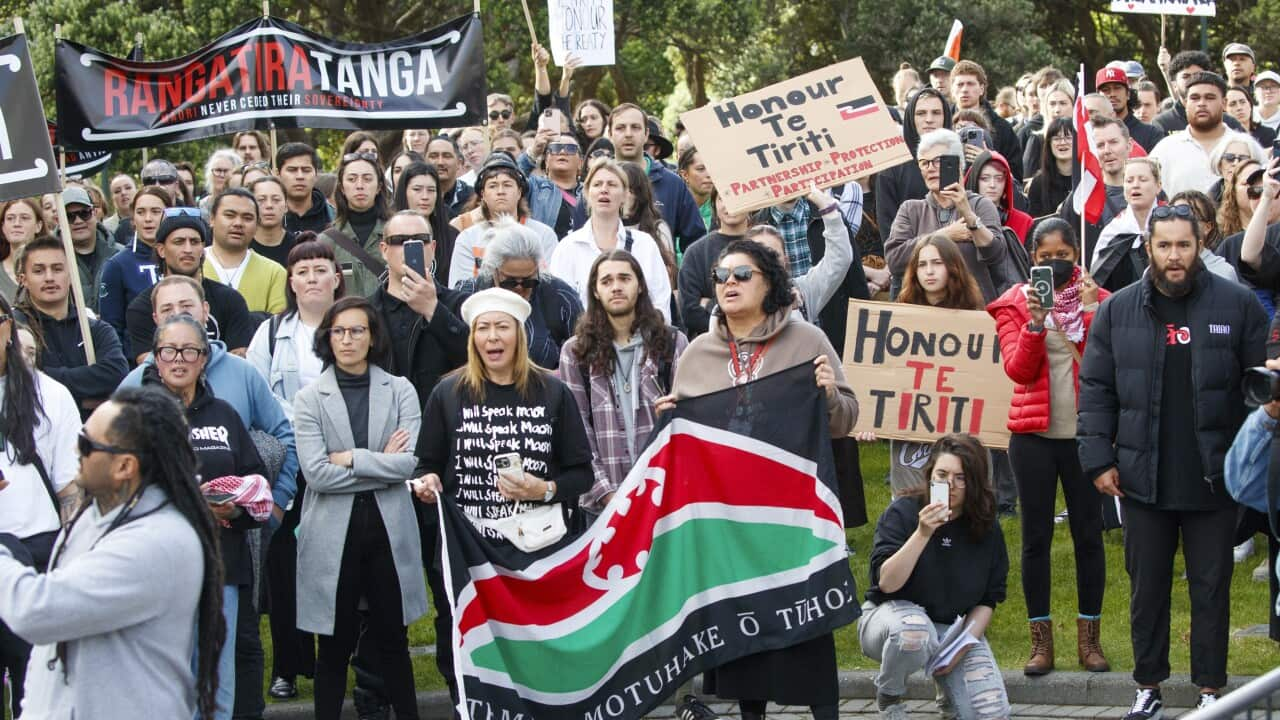Key Points
- Hana-Rawhiti Maipi-Clarke became New Zealand's youngest MP in October 2023.
- In her first speech to parliament, the 21-year-old peformed the Māori haka (war cry).
- She has vowed to protect Māori rights, as the country remains divided over changes announced by the new government.
New Zealand MP Hana-Rawhiti Maipi-Clarke has captivated the world with her performance of a Māori haka in parliament.
The 21-year-old, the youngest MP since 1853, honoured the Indigenous people of New Zealand by performing a traditional haka, or war cry, as part of her first speech to parliament in December.
In the resurfaced video, the chant reverberates around the parliamentary chamber as Māori MPs join in with the haka.
"I will die for you ... but I will also live for you," Maipi-Clarke then says, with parts of her speech delivered in the Indigenous tongue of te reo Māori.
Maipi-Clarke's inaugural address comes amid fears for Māori rights after a new government, led by the conservative National Party, was elected in October.
So what does NZ's youngest MP stand for and why is this moment significant?
Who is Hana-Rawhiti Maipi-Clarke?
The young politician considers herself a guardian of the Māori language and hopes to be the voice of a new generation of young voters in New Zealand.
She replaced veteran Māori politician Nanaia Mahuta in the Hauraki-Wakaito seat in October to represent Te Pāti Māori, a party focused on Indigenous rights.
Maipi-Clarke told Time magazine she wanted to represent younger voters and politically re-engage them by making them aware of how political decisions affect their lives.
She has vowed to protect Māori rights and culture and is an advocate for using Indigenous knowledge and practices to address climate change.
She draws inspiration from her grandfather, Taitimu Maipi, a member of the Māori activist group Nga Tamatoa, and she is also a grand-niece to Māori language activist Hana Te Hemara.
The NZ Herald reported that her great, great, great grandfather was New Zealand's first Māori minister in parliament.
Why are there concerns about Māori rights in New Zealand?
New Zealand's new prime minister, Christopher Luxon, announced at least a dozen policies relating to the Māori population would be repealed or
He labelled it an attempt to "strengthen democracy" and provide New Zealanders with services based on need, not race.
The plans include a potential referendum or review of the principles of the Te Tiriti o Waitangi, or Treaty of Waitangi, a document that upholds Māori rights.
Luxon also signalled he would scrap the Māori Health Authority and remove a smoking ban, both of which were aimed at improving Māori health outcomes.
He also wants to minimise the use of Māori language in the public service and repeal legislation that relates to Māori children in state care.
Thousands have taken to New Zealand's streets to protest the proposed plans, which critics describe as the most significant step backwards for Māori rights in decades.
In an interview with Time magazine, the young MP slammed the new government's "racist rhetoric" and vowed to stay "strong" in her fight against it.
The new government's policies will come up against a record 33 legislators of Māori heritage, or 27 per cent of New Zealand's parliament.
Meanwhile, Maipi-Clarke's party of Te Pati Māori tripled its number of seats in parliament to six, or nearly 4.9 per cent of the legislature.
"We've got a right in a democracy to protest, and you'll start to see various forms of that, and in a more invigorated way, than we're probably seeing in other places where Indigenous people have had to assert their mana (power)," said John Tamihere, Te Pati Maori president.
New Zealanders who identify as Māori make up 17 per cent of the national population.
- With reporting from Reuters











